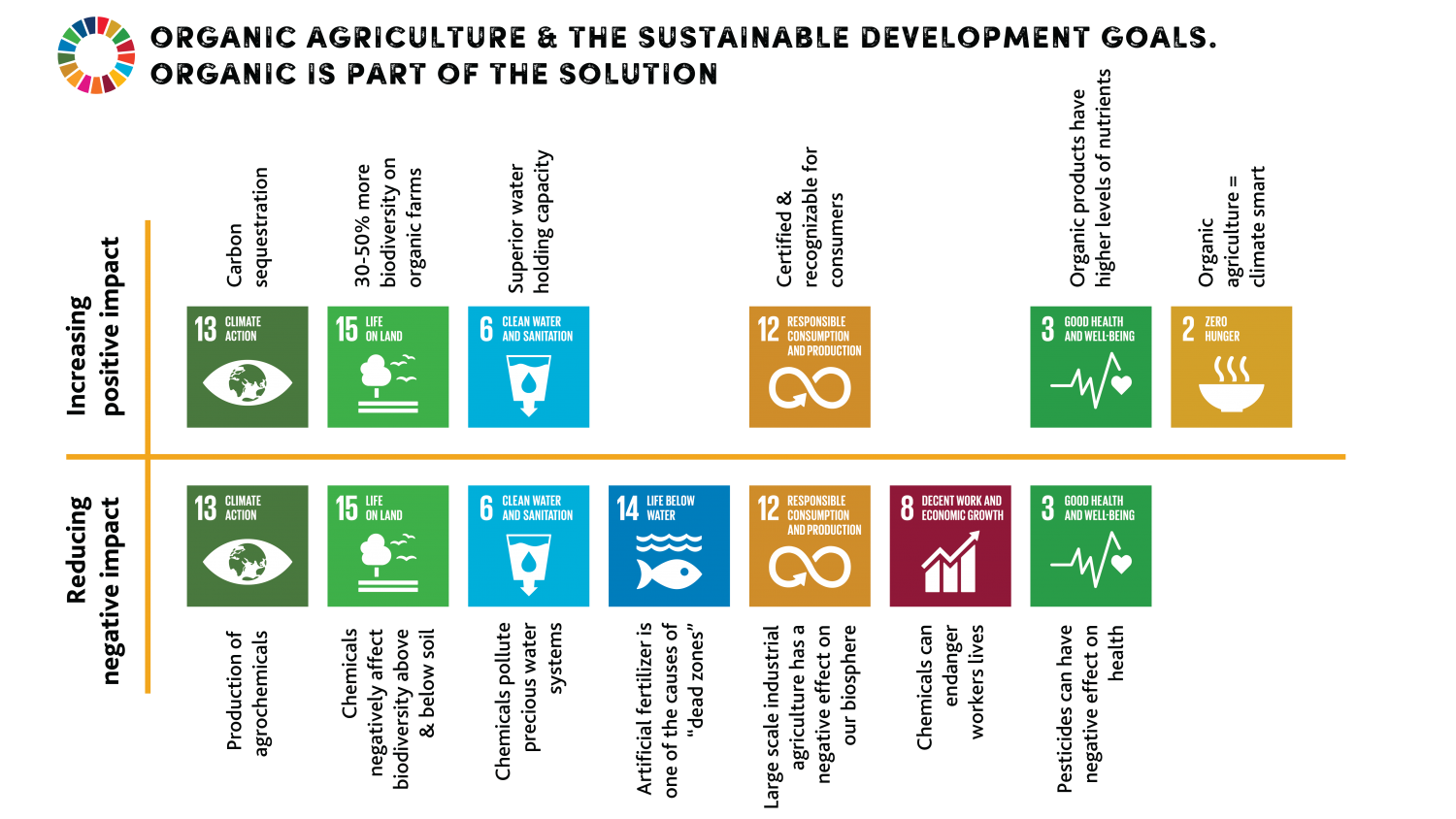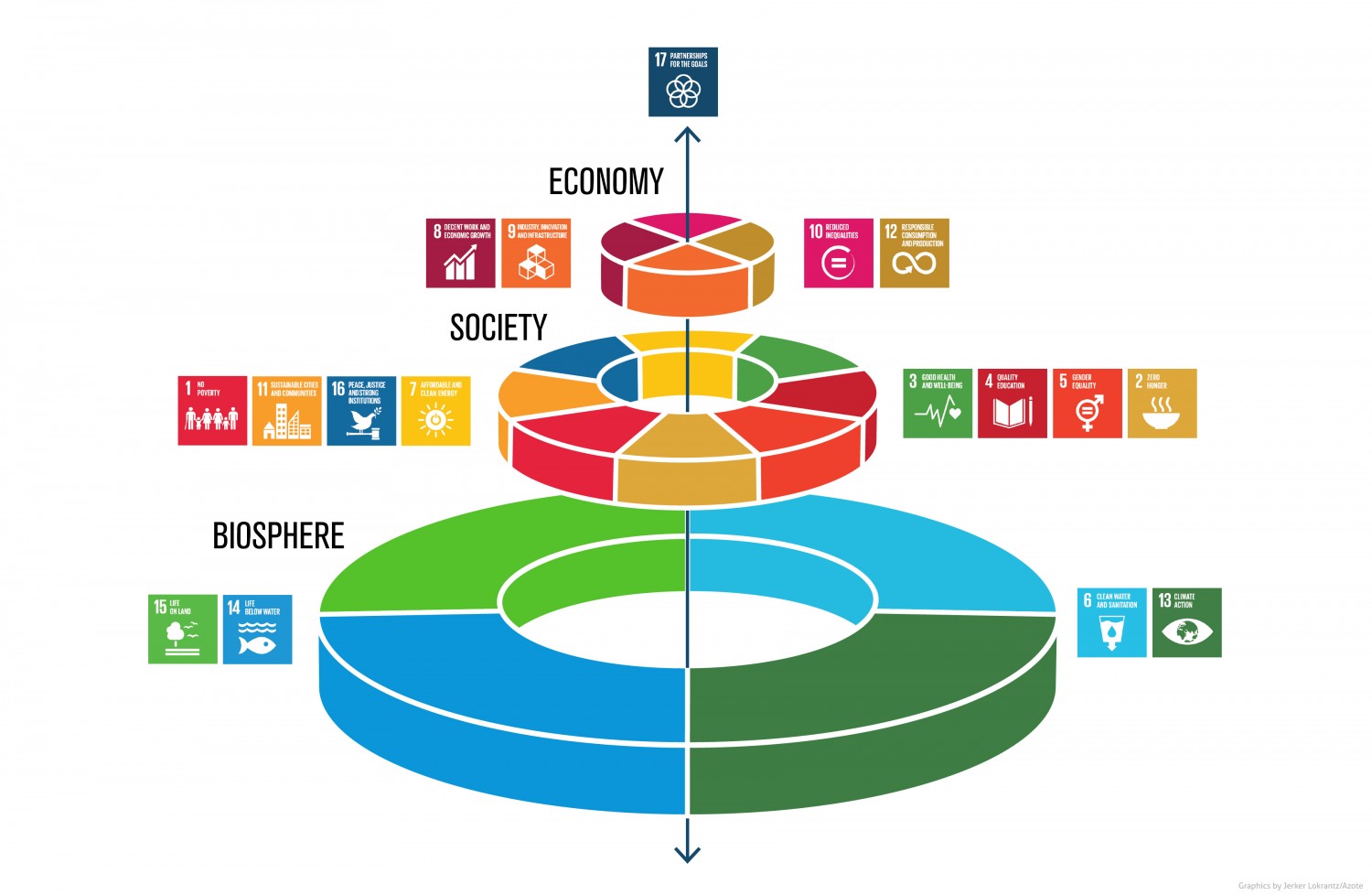The University of Twente’s report, Organic Agriculture and the Sustainable Development Goals, which will be launched on 25 September to mark the official anniversary of the UN SDGs, will conclude that switching to organic agriculture can achieve eight of the 17 SDGs. These include several of the most important Goals, including Taking Urgent Action to Combat Climate Action and its Impacts, Protecting Life on Land by Promoting Sustainable Use of Ecosystems, and Ensuring Clean Water and Sanitation For All.
The study, which was commissioned by Dutch organic specialist Eosta and will be shared across the global organic sector, looked at how organic agriculture can contribute towards meeting the UN SDGs. Based on meta-analysis, the research will conclude that a move towards organic must play a central role if the UN objectives are to be met and we have any chance of tackling the many grave challenges facing the planet.
The report comes exactly four years after 150 world leaders adopted a global transformative agenda for sustainable development, committing to work together to achieve 17 core goals by 2030 to benefit the generations of today and tomorrow. The SDGs build on the Millennium Development Goals and are closely interconnected, meaning success in one can directly affect the success of others.

Practical solutions
Eosta CEO Volkert Engelsman said the global organic sector will be using the report to inform policy makers, retailers and the public about the need to shift towards organic agriculture. However, when it comes to achieving the SDG’s, he believes we are not moving fast enough.
Engelsman said: “Right now we are in the middle of a huge climate, health and biodiversity crises and it is important we focus on realistic practical solutions. We have always been convinced about the positive contribution of organic agriculture and wanted the University of Twente to look at the issue. Although not surprised, we are delighted with the conclusion that organic has so much of a positive impact.
“Together with other organic organisations in Europe, Asia and North America, we will be using the report to further promote and develop sustainable organic agriculture all around the globe.”
Based on research carried out by more than 50 scientific publications, including numerous FAO studies, the report will conclude that organic agriculture can play an important role in achieving no less than eight of the UN 17 SDGs. These include: Zero Hunger (SDG 2), Good Health and Wellbeing (SDG 3), Clean Water and Sanitation (SDG 6), Decent Work and Economic Growth (SDG 8), Responsible Consumption and Production (SDG 12), Climate Action (SDG 13), Life Below Water (SDG 14) and Life on Land (SDG 15).
Together with a broad coalition of organic associations including IFOAM, Naturland (Germany), Organic Sweden, Pro Luomu (Finland), Soil Association (UK), Organic Denmark, Bio Austria, Bio Suisse, Bio Vlaanderen and Wallonie, Irish Organic Board, Bionext, Assobio (Italy), Ecovia (Spain) Oikos (Norway) and numerous organisations in the US, Canada, Malaysia and Japan, Eosta will not only be promoting the results but also making them available for everyone in the organic sector that wants to help share the positive proactive sustainable story of organic agriculture.




 In order to determine the role of organic agriculture a research project was launched with the University of Twente. In the report: Organic Agriculture and the Sustainable Development Goals – Part of the Solution, was launched and showed that organic agriculture has a positive impact on no less than 8 of the 17 goals including Zero Hunger (SDG 2), Good Health and Wellbeing (SDG 3), Clean Water and Sanitation (SDG 6), Decent Work and Economic Growth (SDG 8), Responsible Consumption and Production (SDG 12), Climate Action (SDG 13), Life Below Water (SDG 14) and Life on Land (SDG 15).
In order to determine the role of organic agriculture a research project was launched with the University of Twente. In the report: Organic Agriculture and the Sustainable Development Goals – Part of the Solution, was launched and showed that organic agriculture has a positive impact on no less than 8 of the 17 goals including Zero Hunger (SDG 2), Good Health and Wellbeing (SDG 3), Clean Water and Sanitation (SDG 6), Decent Work and Economic Growth (SDG 8), Responsible Consumption and Production (SDG 12), Climate Action (SDG 13), Life Below Water (SDG 14) and Life on Land (SDG 15). Although all of the 17 SDG’s are extremely important, there are four that have a direct impact on the biosphere of our planet namely SDG 15 (Life on Land) SDG 13 (Climate Action) SDG 15 (Life below Water) and SDG 6 (Clean Water and Sanitation). Since the health of our planet depends on these four goals it is vital that we work extra hard in these four domains. When it comes to food production and consumption, it is clear that agriculture is either part of the solution or part of the problem.
Although all of the 17 SDG’s are extremely important, there are four that have a direct impact on the biosphere of our planet namely SDG 15 (Life on Land) SDG 13 (Climate Action) SDG 15 (Life below Water) and SDG 6 (Clean Water and Sanitation). Since the health of our planet depends on these four goals it is vital that we work extra hard in these four domains. When it comes to food production and consumption, it is clear that agriculture is either part of the solution or part of the problem.